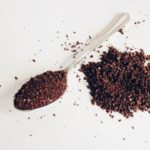I don’t know about you, but when I’m sitting there drinking coffee and enjoying the scent and taste of my favorite beverage, I’m not usually wondering about the facts and fallacies of the nutritional value of the drink. Unless I’m on a diet, of course, in which case every calorie counts; and every summer, getting in shape is on my mind more than usual. Besides which, I do like to know what I’m actually eating and drinking these days and how it’s likely to affect me. So let’s explore a few of thcaose coffee nutrition facts in detail.
Calories in coffee – what’s the buzz?
Well, the amount of calories you’re consuming, as you sip your cup of the black stuff really depends on what you actually put in your coffee.
For a typical 8oz serving of black coffee, with nothing at all added, you’re looking at fewer than 5 calories. As soon as you start adding anything, however, the calorie count increases. The most common additions to coffee are sugar and cream of some description, although it’s more accurate now to say sweetener and dairy milk or milk substitute.
Cream in my coffee – or should I choose soy?
While the traditional additions to that fragrant cup of joe are sugar and cream (or milk), these days we are spoiled for choice. At many coffee shops you’re likely to be asked what kind of milk you’d like – traditional dairy; half-and-half; almond; soya; oat; lactose-free; rice milk – it’s practically endless. You might also be offered milk from goats, sheep or water buffalo, or choose to pick those options up at the store to enjoy at home.
There are so many reasons people might opt for a non-dairy alternative, including dietary allergies, vegan or vegetarian diets, or simply for a change.

Any of these milk types will add nutrition to your coffee, but it varies depending on origin. Dairy milk, typically, is high in carbohydrate, fat, minerals and protein. Full-fat and sheep’s milk varieties, in particular, are high in cholesterol.
For the plant-based options, soy remains the best overall choice if you’re aiming to add nutrition to your coffee; a 1oz addition to your coffee means you only add around 10 calories, but you also add the plant-based protein from the soya bean base. Soy milk is high in fat – but the good variety, the kind we need for optimum health. Coconut milk is high in fat if you’re trying to add calories to your coffee, and oat milk is surprisingly slightly higher in calories than almond milk.
Other relatively recent additions to our milk choices include hemp, flax, peanut, cashew and even pea.
Sweets for the sweet – what difference does sugar make to the calories in your coffee cup?
If you have something of a sweet tooth and enjoy adding sugar to your cup of joe, then you can add 16 calories for every teaspoon of the white stuff. If you decide to add a splash of fat-free milk, every tablespoon adds another 5 calories (that’s half a fluid ounce, approximately).
If you choose half-and-half, the calorie count goes up by around 18 calories per tablespoon. And if you’re really indulging yourself, and adding a little whipping cream to your beverage, you can add about 50 calories per tablespoon. So, in terms of the total calorie count, a coffee with two sugars and two tablespoons of cream will be somewhere in excess of 135 calories.
Should you choose one of the large and luscious coffee shop offerings out there, with all the bells and whistles (or rather, whipped cream, chocolate sprinkles and marshmallows), your cup of coffee can end up “costing” you over 500 calories. In most cases, though, an 8oz serving of coffee will have somewhere between 90 and 220 calories.
Sweet as sugar – coffee sweeteners and syrups – which one should I choose?
There have always been different kinds of sugar available, from white granulated to dark brown sugar, but now you can also choose from a range of syrups – agave, caramel, vanilla, hazelnut, coconut – the list is practically endless. So, um, how many calories will a serving of one of those syrups add to your coffee?
Well, it depends on the exact syrup and the amount, obviously, but typically, a 1 oz serving of a toffee syrup will add 90 calories to your drink. It will also add around 13mg of sodium and 22g of carbohydrate, of which 17mg are sugars.
What’s all this about butter in coffee?
One recent development is adding butter to coffee, which you might sometimes hear called “buttered coffee”. For this drink, you make your coffee and then add grass-fed butter for preference and a dash of coconut oil. There are also ready-prepared mixes you can buy, like Asprey’s Bulletproof Coffee product.

This mix of ingredients means your cup of coffee will have around 200 calories – that’s before you add in anything else, like sugar or syrup.
Nutritional facts about coffee
So now you know how many calories you need to allow for your coffee of choice, what about the actual basic nutrition in coffee itself? Black coffee has no carbohydrate, fat, or protein, but, surprisingly, it does contain amounts of the micronutrients magnesium and potassium (8mg and 92mg respectively) and tiny amounts of manganese, niacin, and riboflavin, as well as a trace of sodium. Depending on the water you use to make your coffee, you may also be adding a small amount of calcium and magnesium.
In case you’re wondering why the micronutrient thing is such a big deal, we may only need them in very small amounts, but they help keep our bodies functioning well, and without them, we’re very vulnerable to disease.
Coffee and dieting
Anyone who’s ever had to watch their calorie intake, especially if they’re trying to lose weight, also knows that coffee can be the dieter’s friend, especially when they find out just how many calories there are in coffee.
So if you’re wondering if coffee actually does have calories, and needs to be counted if you’re being ultra-strict with your calorie intake, the answer is yes – although not very many. That cup of black coffee you’re planning on drinking has less than 5 calories; so even if you treat yourself to a teaspoon of sugar to sweeten your drink, that’s still only around 21 calories in a typical 8oz serving of black coffee.
Having to watch your carbohydrate intake and wondering about the carbs in your coffee? Even better news – a cup of black, brewed coffee has absolutely no carbs – or, strictly speaking, a “negligible” amount. As always, just make sure you enjoy your coffee in moderation and try not to go over the government recommended guidelines for maximum daily caffeine intake. The FDA, for instance, suggests anything over 400mg, or about 4-5 cups of typical strength brewed coffee, is too much.
What about decaffeinated coffee?
So how many calories are there in decaffeinated coffee?
Decaffeinated coffee, like its caffeine-packed cousin, is also low in calories – even lower, in fact; a typical cup of caffeine-free coffee has between zero and two calories.
Coffee benefits – so is coffee good for you?
Well, opinions vary, but overall, even many clinicians now agree that there are real health benefits to be had from coffee (in moderation).
These health benefits may include lower risks for lots of common conditions, including type 2 diabetes, heart conditions and even some kinds of cancer, although much of the research is contradictory. Since everyone is different, it’s always a good idea to check with your health professional about how it might affect you.
Coffee beans themselves include phytochemicals, which are naturally occurring chemicals in plants, which have been shown to be good for health.
Other benefits of coffee
As well as the health benefits, coffee can also help with alertness – anyone who’s ever been on a long journey and needed to wake up, or who’s had to stay up all night for various reasons, will be able to vouch for that effect (raises hand).
Anyone who’s ever had to sit through corporate training events, or deliver them, will know how useful coffee can be in those situations too (raises hand again).
Coffee is a great way to start a training course, end a training course, serve as an informal ice-breaker or bring people together for an informal chat. (And just think how many long-term relationships and friendships have started with the question, “Would you like to meet up for a coffee some time?”)
Apart from all of that, just think how different our society would look, from politics to literature, if the coffee house had never existed.
So however you choose to drink yours, make sure whatever you add to your coffee is right for you, sit back, imbibe, and enjoy.

Hi my name is Larry, a coffee aficionado from the US. I have already visited Colombia, Sumatra, Guatemala, Costa Rica, Ethiopia and Jamaica in my pursuit of finding the best-tasting coffee beans. I currently write from Bali and enjoy the relaxed life that you can only find in Canggu. Welcome to my coffee world!





